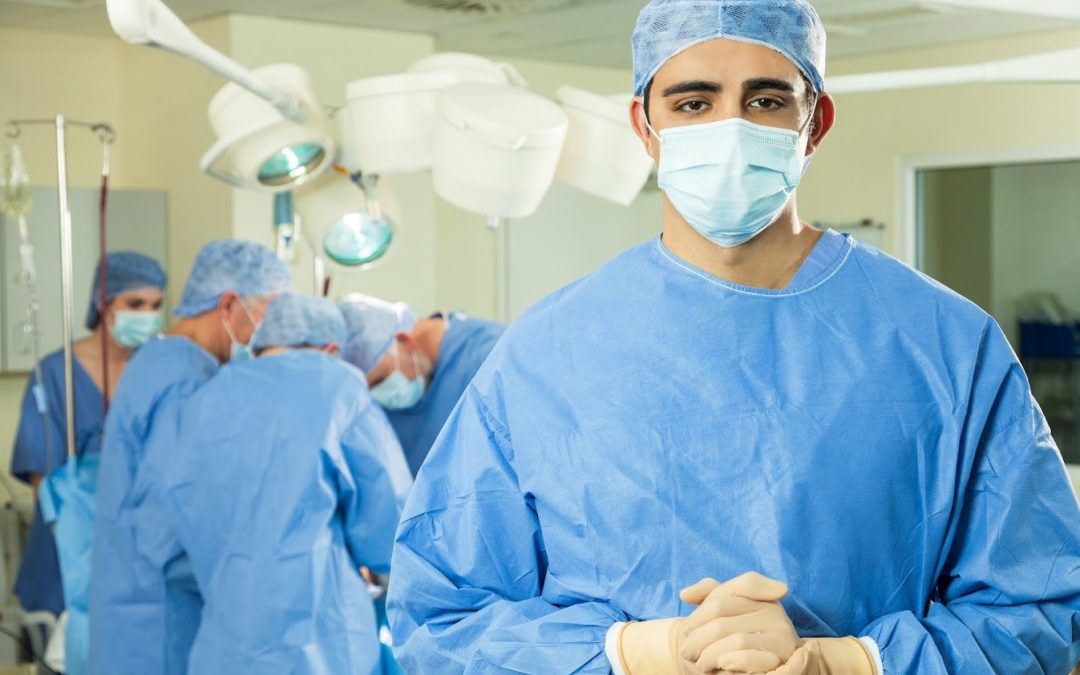Appendectomy, or appendix removal surgery, remains the most common and most reliable treatment for appendicitis. During an appendectomy, a general surgeon removes an inflamed appendix to prevent further complications for the patient.
What Is the Appendix and What Does it Do?
Many people don’t usually think about their appendix until they see a problem. In terms of obvious day-to-day bodily functions, the appendix does not play an obvious role, but it is believed to play a role in digestion. The appendix looks like a small tube-like attachment near where the small intestine meets the large intestine. This organ is about four inches long and is usually located in the lower abdomen.
Maybe Not So Useless?
In modern medicine, doctors have had a difficult time determining the function of the appendix. Many theories suggest that this vestigial organ is the result of a genetic or evolutionary layover. As a result, the appendix has earned its reputation as a useless organ. However, new studies and theories suggest that the appendix may play a key role in housing and protecting good gut bacteria.
Researchers have also discovered that the appendix also supports the body’s immune system during fetal development, and continues to do so during the earlier years of life. White blood cells and other antibodies and antigens can reside in the appendix to help reduce the chance of harmful immune responses in the gut.
Outside of its possible natural functions, surgeons use the appendix tissue in urinary tract reconstruction surgery to treat incontinence by reinforcing or replacing a weakened or damaged sphincter.
However, the appendix still carries a reputation of getting infected and causing problems like appendicitis.
What Is Appendicitis?
Appendicitis normally occurs when the appendix becomes inflamed due to a blockage, infection, or cancer. The cause of blockages usually includes either fecal matter or a foreign body. Appendicitis from infection is especially possible because the appendix tends to swell when the body becomes infected due to the lymphatic tissue in the appendix wall.
When the appendix becomes blocked, pus, stool, and mucus build up inside it along with bad bacteria. If blocked for long enough, the appendix will swell, lose blood flow, develop abscesses, and even perforate (burst). If you experience symptoms of appendicitis, such as pain in the lower right abdomen, fever, and nausea, seek medical attention right away.
Symptoms of Appendicitis
 Acute Appendicitis
Acute Appendicitis
- Pain around the navel that moves to the lower right abdomen in the first few hours
- Fever
- Chills
- Nausea
- Vomiting
Furthermore, you should know that any pain associated with appendicitis will not go away. If the pain does get better after a few hours, then that is a good sign that you do not have appendicitis.
Ruptured Appendicitis
 Signs of a ruptured appendix start with the same symptoms as normal appendicitis, but patients have been known to present additional symptoms. Signs of a ruptured appendix include:
Signs of a ruptured appendix start with the same symptoms as normal appendicitis, but patients have been known to present additional symptoms. Signs of a ruptured appendix include:
- Nausea
- Abdominal pain
- Bloating
- Loss of appetite
- Fever
- Constipation
- Diarrhea
- Swollen abdomen
- Abdominal pain that gets worse with physical activity
Patients also report an inability to pass gas, and tenderness around their abdomen that gets worse when pressure is applied and quickly released.
What Happens When My Appendix Bursts?
When the appendix is blocked by inflammation or by bowel contents, bacteria become trapped. The appendix will start to swell further, and an abscess can form as the tissue becomes infected. Left untreated, the appendix can perforate and spread infectious material through the abdominal cavity. The infectious material from the burst appendix leads to serious infections that are difficult to treat.
After material leaks from the burst appendix, the body will try to contain the contaminants by forming an abscess. The abscess is a collection of all the bacteria, pus, stool, and other infectious material gathered into one spot in the abdominal cavity. Symptoms of an abscess include pain localized to one area, persistent fever, chills, and physical weakness. Patients report both dull aching pains and sharp stabbing pains.
How Serious Is a Burst Appendix?
Perforation of the appendix is a medical emergency and requires immediate surgical attention. Ideally, appendicitis will be caught before perforation or rupture. Obviously, removing the appendix is much easier when still intact. Additionally, performing appendectomy before perforation or rupture allows a Tennessee general surgeon to use less invasive surgical techniques. As a result, you will heal faster after your treatment.

Appendectomy Procedures
Two types of appendectomy approaches exist, and each has its benefits.
Open Appendectomy
An open appendectomy cuts a large opening in the abdomen to allow immediate access to the infected tissue. An open appendectomy requires a longer healing time, but this approach can be necessary when swift removal is paramount to the patient’s safety. If the appendix has already perforated, an open procedure may be the best approach in order to ensure that the abdominal area is cleared.
Minimally-Invasive Appendix Surgery
A laparoscopic appendectomy uses a series of tiny incisions to enter the abdomen and remove the appendix with the assistance of a small camera to give the surgeon a view of the affected area. Laparoscopic procedures are beneficial because they are much less invasive. The healing time is faster, and the patient won’t experience as much post-surgical discomfort. These procedures are more delicate and they can take longer in the operating room. However, patients of laparoscopic appendectomy at The Surgical Clinic have fewer scars and faster recovery times.
Sometimes, your appendix surgery can be delayed. If you already have an infection because your appendix has burst, surgery may not be the right option for you. Your doctor may recommend and prescribe powerful antibiotics before any surgery. It is key to deal with the infection first, before a surgical operation. If the infection is not dealt with, then you will be at risk for a slower recovery rate and even severe post-surgery infection.
Recovery
Recovery From Minimally Invasive Appendix Surgery
Fortunately, recovering from appendicitis is not intensive, especially if your appendix was removed before it ruptured. With a simple laparoscopic surgery, you may only need one or two days of recovery under direct medical supervision before heading home. You will need more rest at home, and you will need to avoid heavy lifting and strenuous physical activity. Your doctor will give you specific instructions to help you recover as quickly as possible.
Appendix surgery is a relatively minor procedure, and most patients recover quickly. Some common post-operative symptoms include nausea, vomiting, and diarrhea. Recovery time typically ranges from one to two weeks.
Recovery From Ruptured Appendix Treatment and Surgery
The recovery from a burst appendix is more intensive, depending on how much the infection spreads. You might need to remain in the hospital for several days. You might not be able to eat or drink without the assistance of an IV. After your release, you might still need to follow specific dietary restrictions, and you’ll need to watch for infection or pain at the incision site.
Conclusion
Your appendix is an interesting addition to your digestive system, while people can live easily without it, it still causes painful infections.
The board-certified general surgeons at The Surgical Clinic specialize in conditions of the abdomen and nearby structures to help treat patients with a range of conditions. For more information about appendectomy and other general surgery, contact us at The Surgical Clinic.
General surgeons in Greater Nashville

Dr. John Boskind
General Surgeon
SUMMIT

Dr. Mariana Chavez
General Surgeon
Downtown

Dr. Patrick Davis
General Surgeon
SOUTHERN HILLS

Dr. Gretchen Edwards
General Surgeon
DOWNTOWN

Dr. Alex Fruin
General Surgeon
SUMMIT

Dr. James Griscom
General Surgeon
NASHVILLE

Dr. Mark Hinson
General Surgeon
COLUMBIA

Dr. George Lynch
General Surgeon
NASHVILLE

Dr. Clinton Marlar
General Surgeon
SKYLINE

Dr. Willie Melvin
General Surgeon
SMYRNA

Dr. Chad Moss
General Surgeon
COLUMBIA

Dr. William Polk
General Surgeon
NASHVILLE

Dr. Drew Reynolds
General Surgeon
ST. THOMAS WEST

Dr. Joshua Taylor
General Surgeon
SMYRNA

Dr. Davidson Oxley
General Surgeon
COLUMBIA

Dr. Tyson Thomas
General Surgeon
ST. THOMAS WEST

Dr. John Valentine
General Surgeon
HENDERSONVILLE

Dr. Patrick Wolf
General Surgeon
ST. THOMAS WOLF

